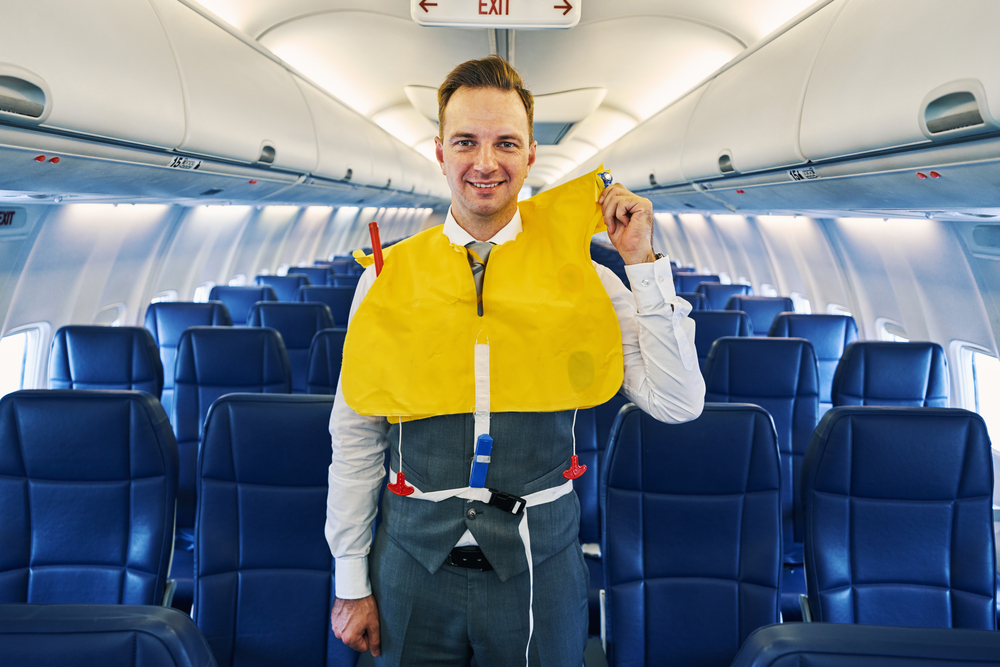If you are considering becoming a cabin crew member, it is important to understand the specific cabin crew skills that can help you shine during the recruitment process. With many candidates vying for the same position, standing out can be challenging. However, by honing a particular set of critical cabin crew skills, you can smooth the path to securing your dream job and enhance your chances of success.
In this article, we will explore what makes a successful flight attendant and dive into the cabin crew skills you need to excel in your daily duties. We will highlight the ten essential qualities that are crucial for thriving in the air, ensuring you are fully prepared to meet the challenges of the cabin crew role.
Table of Contents
10 essential cabin crew skills
1. Exceptional communication and conflict-solving skills
Effective communication is a cornerstone of essential cabin crew skills. As safety is every airline’s priority, flight attendants must clearly convey safety instructions, make announcements, and interact with passengers to ensure everyone is informed and reassured.
In the close quarters of an airplane cabin, tensions can quickly escalate between passengers. Whether it is disagreements over seating arrangements, overhead bin space, or noise levels, conflicts may arise. Cabin crew need conflict-solving skills to de-escalate these situations calmly and efficiently, preventing disruptions to the flight and ensuring a peaceful atmosphere.
Good communication and conflict-solving skills become even more important in the event of an emergency onboard, such as a medical emergency or aircraft systems malfunction. Flight attendants must work together under pressure to manage the situation, make quick decisions, and ensure the safety of passengers. Disagreements or misunderstandings may arise during high-stress situations; thus, excellent communication skills enable the crew to focus on the task at hand.
2. Robust customer service proficiency
Customer service is one of the most essential cabin crew skills that sets exceptional flight attendants apart. As the primary point of contact for passengers, cabin crew represent the airline. The way they interact with passengers has a direct impact on the overall satisfaction of the flight. Possessing strong customer service skills is crucial, as it helps flight attendants to address passenger inquiries, manage complaints with empathy, and provide a welcoming and professional atmosphere throughout the journey. When flight attendants can resolve issues promptly and courteously, it can significantly enhance passengers’ perceptions of the airline, contributing to higher satisfaction levels and repeat business.
On the flip side, poor customer service can lead to complaints, negative reviews, and even long-term damage to the airline’s reputation. This, in turn, can impact the airline’s competitiveness in the market, making the role of customer service in cabin crew duties a critical one.
3. Flexibility and adeptness in teamwork
Flight attendants must work seamlessly with their colleagues and the cockpit crew to ensure a smooth and safe flight. Effective teamwork is another essential cabin crew skill for managing tasks efficiently and ensuring that everything runs smoothly. This includes coordinating boarding procedures, assisting passengers, handling in-flight services, and responding to emergencies when they arise.
When team dynamics are strong, crew members can anticipate each other’s needs, communicate clearly, and react swiftly in high-pressure situations. This unity creates a sense of confidence among passengers and ensures that the flight experience is both comfortable and secure.
However, without effective teamwork, the potential for miscommunication, disorganization, and delays increases rapidly. These issues can affect the safety and comfort of passengers, disrupt the flight’s operations, and even escalate into larger problems during emergencies.
4. Cultural awareness and sensitivity
Flight attendants are required to develop their cultural awareness and sensitivity skills for several significant reasons. As the aviation industry continues to globalize, flights often accommodate passengers from diverse cultural backgrounds, each with unique customs, traditions, and communication styles. Understanding and respecting cultural differences is essential for providing inclusive, respectful, and culturally sensitive service.
For example, cultural differences in personal space norms may require flight attendants to adjust their approach when interacting with passengers from different regions. Similarly, dietary restrictions and meal preferences can vary widely across cultures, necessitating sensitivity and accommodation when serving in-flight meals. By demonstrating cultural awareness and sensitivity, flight attendants foster a welcoming atmosphere onboard, promote mutual respect among passengers, and contribute to the overall success of the flight.
But without cultural awareness and sensitivity, flight attendants might inadvertently offend passengers, leading to complaints and a negative travel experience, which can harm the airline’s reputation irreversibly.

5. Physical stamina and endurance combined with emotional resilience
Sometimes, a cabin crew job is more challenging than it appears. The job of a flight attendant entails long hours on their feet, managing heavy luggage, and dealing with the physical challenges of working in a confined space. Thus, physical stamina and endurance are the key cabin crew skills. They often experience irregular schedules and frequent time zone changes, leading to disrupted sleep patterns and fatigue. Without adequate physical stamina and endurance, flight attendants may struggle to perform their duties efficiently, compromising passenger safety and service quality.
Meanwhile, emotional resilience also plays an important role here. From handling in-flight emergencies to managing difficult passengers, flight attendants are frequently exposed to high-stress situations that require quick thinking and calm composure.
Emotional resilience helps to remain focused, maintain professionalism, and effectively manage stressful situations without becoming overwhelmed. For example, when faced with an unruly passenger or a medical emergency, flight attendants must remain composed, assess the situation, and take appropriate action to ensure the safety and well-being of passengers.
6. Attention to detail
Safety comes first, it is crucial, it is always the top priority! Therefore, attention to detail is one of the most essential skills for cabin crew.
Whether it is following safety protocols, remembering passenger preferences, or ensuring the cabin remains clean and organized, every detail matters. A cabin crew with strong attention to detail plays a vital role in delivering high-quality service while keeping the environment safe for everyone on board.
Without this skill, essential aspects could be missed, such as properly checking emergency equipment or adhering to safety guidelines. This not only poses potential safety risks but can also negatively impact the overall passenger experience, leading to a decline in service quality. Precision and focus on every task, no matter how small, are what make a flight attendant stand out and ensure a smooth, secure flight for all.
7. Sales skills
While sales skills might not be the initial thought when pondering the most essential skills for cabin crew, the reality is that selling is an integral part of their responsibilities on each flight.
Flight attendants need sales skills for various reasons. One of the key aspects of their role involves handling duty-free sales during flights, where they promote and sell products to passengers. These sales are not only a source of revenue for the airline but also play a significant role in enhancing the overall customer experience. Flight attendants who are skilled in sales can offer personalized recommendations, making passengers feel more valued and improving their in-flight experience.
Additionally, strong sales skills enable flight attendants to meet and exceed monthly sales targets set by the airline. Achieving these targets contributes to optimizing ancillary revenue, which in turn can secure financial rewards or bonuses for the cabin crew, supplementing their base salary. This ability to effectively balance service with sales makes sales skills an invaluable asset for cabin crew.
8. Multilingual capabilities
Multilingual capabilities are invaluable assets, especially when flying on international routes. The ability to speak multiple languages allows flight attendants to communicate more effectively with passengers from different parts of the world, enhancing the overall passenger experience. When cabin crew can converse with passengers in their native language, it not only fosters a sense of comfort and trust but also ensures that passengers feel more at ease during their journey.
In emergency situations or moments requiring urgent assistance, multilingual skills can be the difference between a smooth resolution and a dangerous delay. Language barriers can significantly hinder communication, making it harder for flight attendants to offer clear instructions or provide reassurance in high-stress situations. However, multilingual crew members can give important safety instructions, assist passengers with special needs, and offer emotional support with greater ease.
Beyond passenger interactions, multilingual skills also benefit the internal dynamics of the crew. In diverse teams, understanding and speaking multiple languages can enhance relationships among crew members, as it promotes mutual respect for different cultural backgrounds. This, in turn, fosters a more supportive and collaborative work environment.
9. Time management
Every second counts when it comes to the airline’s bottom line. This is where time management becomes a crucial skill for cabin crew. In the fast-paced and high-pressure environment of an aircraft, flight attendants are required to balance a wide range of responsibilities, often with limited time available. An ability to efficiently manage time ensures that each task is completed swiftly and effectively, helping the entire flight run smoothly and on schedule.
For example, flight attendants must coordinate with ground staff to ensure a seamless boarding process, making sure passengers are seated quickly and safely. They must also manage meal services efficiently, ensuring that all passengers are served in a timely manner while also accommodating their unique dietary needs. This requires careful planning and organization to ensure that meal services do not interfere with other in-flight tasks.
In addition to routine tasks, cabin crew must be adept at handling unexpected disruptions or emergencies. Whether it is a technical issue, a medical emergency, or an unruly passenger, time is of the essence. Effective time management allows flight attendants to assess the situation quickly, prioritize tasks, and execute the necessary procedures.
10. First aid skills and medical knowledge
In-flight emergencies, such as medical incidents or cardiac arrests, can occur at any moment during a flight, and when they do, immediate intervention is crucial. Flight attendants are often the first responders in these situations, as they are trained to recognize the signs of medical distress and act quickly.
To provide effective assistance during a medical emergency, flight attendants must possess comprehensive medical knowledge and strong first aid skills. This includes knowing how to perform cardiopulmonary resuscitation (CPR), how to properly use defibrillators, and how to manage minor injuries or illnesses that may arise during a flight. Cabin crew are also trained to stabilize patients, provide comfort, and keep them calm until medical professionals are available to take over.
Without these essential medical skills, a flight attendant would be unable to provide the necessary support to passengers in need, potentially resulting in worsened conditions, complications, or even fatalities.
You can find more information about the first aid skills and other essential training for cabin crew in the EASA guidelines on initial cabin crew training here.

To sum up: The Top 10 essential qualities for cabin crew
| Cabin crew skill | Why is it essential? | |
| 1. | Communication and conflict-solving skills | To ensure passenger safety, manage conflicts, and effectively respond to emergencies |
| 2. | Customer service skills | To ensure passenger satisfaction, handle inquiries, and resolve issues professionally |
| 3. | Flexibility and adeptness in teamwork | To efficiently manage tasks and adapt to dynamic situations during flights |
| 4. | Cultural awareness and sensitivity | To foster a positive and inclusive environment by serving passengers from diverse backgrounds with respect and understanding |
| 5. | Physical stamina, endurance | To maintain performance during long hours and physically demanding tasks |
| 6. | Attention to detail | To ensure safety and high-quality service |
| 7. | Sales skills | To boost airline revenue and enhance the passenger experience |
| 8. | Multilingual capabilities | To improve communication between other team members and provide better service |
| 9. | Time management | To ensure efficient operations and meet tight schedules |
| 10 | First aid skills and medical knowledge | To provide immediate assistance in in-fight emergencies |
Curious to learn more about the cabin crew profession?
Mastering these ten essential qualities not only helps you stand out during the recruitment process but also ensures you can handle the daily challenges of the cabin crew job effectively.
But the journey to becoming an exceptional flight attendant does not end here. Explore our other guide, which outlines the essential steps for starting a cabin crew career and provides valuable tips for your professional development. If you are interested in learning how to craft an outstanding CV, this article will be helpful.
Continue discovering more, and let your dreams take flight!

